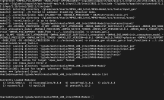nakulkarle
New member
Hello Everyone,
I am a little lost and need some guidance.
What changes do I need to make regarding the dense meshes before running the init_atmosphere component? A note is provided on the mesh download webpage, but unfortunately, I did not fully understand it. I want to process static and terrestrial fields for 12km quasi-uniform mesh.
When I run the "init_atmosphere" there is no error file generated. However, the job doesn't seem to run completely. This is what the "log.init_atmosphere.0000.out" have in it
--------------------------------------------------------------------------------------------------------------------------------------
----------------------------------------------------------------------
Beginning MPAS-init_atmosphere Output Log File for task 0 of 1
Opened at 2023/06/26 16:38:33
----------------------------------------------------------------------
Using default single-precision reals
Reading namelist from file namelist.init_atmosphere
Reading streams configuration from file streams.init_atmosphere
Found mesh stream with filename template x1.4096002.grid.nc
Using default io_type for mesh stream
** Attempting to bootstrap MPAS framework using stream: input
Bootstrapping framework with mesh fields from input file 'x1.4096002.grid.nc'
WARNING: Attribute parent_id not found in x1.4096002.grid.nc
WARNING: Setting parent_id to ''
* Requested field lbc_scalars is deactivated due to packages, or is a scratch variable.
* Requested field lbc_u is deactivated due to packages, or is a scratch variable.
* Requested field lbc_w is deactivated due to packages, or is a scratch variable.
* Requested field lbc_rho is deactivated due to packages, or is a scratch variable.
* Requested field lbc_theta is deactivated due to packages, or is a scratch variable.
Parsing run-time I/O configuration from streams.init_atmosphere ...
----- found immutable stream "input" in streams.init_atmosphere -----
filename template: x1.4096002.grid.nc
filename interval: none
direction: input
reference time: initial_time
record interval: -
input alarm: initial_only
----- found immutable stream "output" in streams.init_atmosphere -----
filename template: x1.4096002.static.nc
filename interval: none
direction: output
reference time: initial_time
record interval: -
output alarm: initial_only
package: initial_conds
----- found immutable stream "surface" in streams.init_atmosphere -----
filename template: x1.40962.sfc_update.nc
filename interval: none
direction: output
reference time: initial_time
record interval: -
output alarm: 86400
package: sfc_update
----- found immutable stream "lbc" in streams.init_atmosphere -----
filename template: lbc.$Y-$M-$D_$h.$m.$s.nc
filename interval: 3:00:00
direction: output
reference time: initial_time
record interval: -
output alarm: 3:00:00
package: lbcs
----- done parsing run-time I/O from streams.init_atmosphere -----
** Validating streams
Reading dimensions from input streams ...
----- reading dimensions from stream 'input' using file x1.4096002.grid.nc
nCells = 4096002
nEdges = 12288000
nVertices = 8192000
TWO = 2
maxEdges = 6
maxEdges2 = 12
vertexDegree = 3
----- done reading dimensions from input streams -----
Processing decomposed dimensions ...
----- done processing decomposed dimensions -----
Assigning remaining dimensions from definitions in Registry.xml ...
THREE = 3
FIFTEEN = 15
TWENTYONE = 21
R3 = 3
nVertLevels = 55 (config_nvertlevels)
nSoilLevels = 4 (config_nsoillevels)
nFGLevels = 38 (config_nfglevels)
nFGSoilLevels = 4 (config_nfgsoillevels)
nVertLevelsP1 = 56
nMonths = 12 (config_months)
----- done assigning dimensions from Registry.xml -----
------------------------------------------------------------------------------------------------------------------------
Thank you.
I am a little lost and need some guidance.
What changes do I need to make regarding the dense meshes before running the init_atmosphere component? A note is provided on the mesh download webpage, but unfortunately, I did not fully understand it. I want to process static and terrestrial fields for 12km quasi-uniform mesh.
When I run the "init_atmosphere" there is no error file generated. However, the job doesn't seem to run completely. This is what the "log.init_atmosphere.0000.out" have in it
--------------------------------------------------------------------------------------------------------------------------------------
----------------------------------------------------------------------
Beginning MPAS-init_atmosphere Output Log File for task 0 of 1
Opened at 2023/06/26 16:38:33
----------------------------------------------------------------------
Using default single-precision reals
Reading namelist from file namelist.init_atmosphere
Reading streams configuration from file streams.init_atmosphere
Found mesh stream with filename template x1.4096002.grid.nc
Using default io_type for mesh stream
** Attempting to bootstrap MPAS framework using stream: input
Bootstrapping framework with mesh fields from input file 'x1.4096002.grid.nc'
WARNING: Attribute parent_id not found in x1.4096002.grid.nc
WARNING: Setting parent_id to ''
* Requested field lbc_scalars is deactivated due to packages, or is a scratch variable.
* Requested field lbc_u is deactivated due to packages, or is a scratch variable.
* Requested field lbc_w is deactivated due to packages, or is a scratch variable.
* Requested field lbc_rho is deactivated due to packages, or is a scratch variable.
* Requested field lbc_theta is deactivated due to packages, or is a scratch variable.
Parsing run-time I/O configuration from streams.init_atmosphere ...
----- found immutable stream "input" in streams.init_atmosphere -----
filename template: x1.4096002.grid.nc
filename interval: none
direction: input
reference time: initial_time
record interval: -
input alarm: initial_only
----- found immutable stream "output" in streams.init_atmosphere -----
filename template: x1.4096002.static.nc
filename interval: none
direction: output
reference time: initial_time
record interval: -
output alarm: initial_only
package: initial_conds
----- found immutable stream "surface" in streams.init_atmosphere -----
filename template: x1.40962.sfc_update.nc
filename interval: none
direction: output
reference time: initial_time
record interval: -
output alarm: 86400
package: sfc_update
----- found immutable stream "lbc" in streams.init_atmosphere -----
filename template: lbc.$Y-$M-$D_$h.$m.$s.nc
filename interval: 3:00:00
direction: output
reference time: initial_time
record interval: -
output alarm: 3:00:00
package: lbcs
----- done parsing run-time I/O from streams.init_atmosphere -----
** Validating streams
Reading dimensions from input streams ...
----- reading dimensions from stream 'input' using file x1.4096002.grid.nc
nCells = 4096002
nEdges = 12288000
nVertices = 8192000
TWO = 2
maxEdges = 6
maxEdges2 = 12
vertexDegree = 3
----- done reading dimensions from input streams -----
Processing decomposed dimensions ...
----- done processing decomposed dimensions -----
Assigning remaining dimensions from definitions in Registry.xml ...
THREE = 3
FIFTEEN = 15
TWENTYONE = 21
R3 = 3
nVertLevels = 55 (config_nvertlevels)
nSoilLevels = 4 (config_nsoillevels)
nFGLevels = 38 (config_nfglevels)
nFGSoilLevels = 4 (config_nfgsoillevels)
nVertLevelsP1 = 56
nMonths = 12 (config_months)
----- done assigning dimensions from Registry.xml -----
------------------------------------------------------------------------------------------------------------------------
Thank you.

